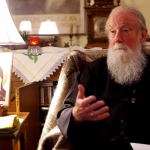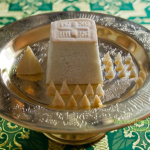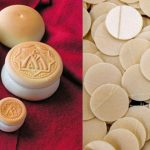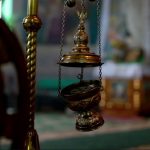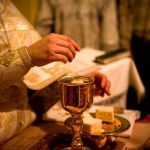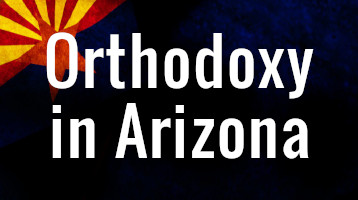As we prepare for the spiritual work of Great Lent, take some time to listen to these wonderful teachings by Fr. Serafim Gascoigne of Seattle, WA on interior life, the Jesus Prayer, and how not to be overwhelmed and enslaved by your thoughts. … [Read more...]
How Can We Know When Christ Was Born?
Why do we celebrate the Nativity of Christ on December 25th? There's a lot of myth and distortion, as well as outright deception, regarding why Christians celebrate Christmas on December 25th. Much of it is borne of ignorance, but Christians especially should be aware that the Church is a reliable and authentic bearer of truth, and a faithful witness of God's interactions with man in history. You've probably seen many of the strange claims about it - that pagan figures such as Horus, or Mithra, or Dionysius, or some other pagan deity had 12 disciples, was born of a virgin, etc. They are all completely false, and even a cursory examination into these claims reveals their … [Read more...]
The Men who Failed to Paganize the Origins of Christmas
by John Sanidopoulos Every Christmas season, the usual myths are hauled out and distributed for popular consumption. You know them. We’ve all heard or read them. That Christmas celebrations were stolen from the Romans The Christmas tree is a pagan hangover That other gods had virgin births That Yule and the mistletoe are all about Odin These falsehoods are repeated often and loudly, under the guise of being “historical truths.” And strangely they still stump most Christians, who are then filled with doubt about what they believe. Of course, these myths were designed to elicit precisely this sort of reaction from believers. All of them were invented in the 18th- and … [Read more...]
About the Particles Taken out During the Proskomedia
“And there will be one flock and one shepherd” (John 10:16). Since ancient Apostolic times the Liturgy was served with one Bread (and one Chalice) following Christ’s example. This tradition remained in the West. In the East, according to Archimandrite Cyprian (Kern), “The Byzantine Empire weaved a lot of theological and mystical patterns in the liturgical cloth”. In particular, the best bread was chosen as the lamb, while small particles were taken out from all the other breads and placed on the diskos near the lamb in memory of those who had brought those breads (such liturgical tradition exists since 11th century; before that time all the other breads were just raised with … [Read more...]
The Baptism of Infants
How long have Christians been baptizing infants? From the beginning. For more information, see Articles on Infant Baptism at Preachers Institute … [Read more...]
Eucharistic Bread: Leavened or Unleavened?
In the Bible, unleavened bread is called "unleavened bread," whereas leavened bread is simply called "bread." The Jews at that time would have understood this as would have the early Christians. It says that "He took bread," meaning leavened bread; and the Christians, being first instructed by the Apostles and then reading in the Gospels some time later, implemented this. At the Mystical Supper, it is obvious that our Lord was changing things, to tie the Passover meal with its fulfillment, the Eucharist. One of those changes, obviously, was using leavened bread instead of unleavened, or at least leavened in addition to unleavened. The world was empty and devoid of grace before Christ, as is … [Read more...]
On the Great Blessing of Waters
by St. Sophronius of Jerusalem O Trinity supreme in being, in goodness, and in Godhead, almighty, who watchest over all, invisible, incomprehensible, Maker of spiritual beings and rational natures, innate Goodness, Light that none can approach and that lightens every man that comes into the world: Shine also upon me Thine unworthy servant. Enlighten the eyes of my understanding that I may make bold to sing the praises of Thy measureless beneficence and Thy might. May the prayer be acceptable that I offer for the people here present. Let not my faults hinder Thy Holy Spirit from coming to this place, but suffer me now uncondemend to cry to Thee, O most good Lord, and to say: We glorify … [Read more...]
The Theological Meaning of Vespers
Great Vespers is, for many, their favorite regular service in Orthodox worship. It has great theological meaning, and as the first service at the start of the liturgical day, it has great significance. This article will enrich your experience of Vespers. The Vespers service (the first service of the liturgical day) is meant to remind us of the Old Testament period, the creation of the world, the first human beings fall into sin, of their expulsion from Paradise, their repentance and prayer for salvation, the hope of mankind in accordance with the promise of God for a Savior and ending with the fulfillment of that promise. The service begins with the opening of the Royal Doors and the … [Read more...]
Why the Seder?
Part three of our republishing of 'The Contemporary Protestant Seder: Anachronistic Revisionism?' by the Rev. Dr. Dcn. Timothy J. Wilkinson Why the Seder? Given the clear linkage between the Passover, the Seder meal, and the Eucharist – and the apparent lack of understanding of, or interest in this linkage – motives for participation in the Seder meal appear to fall into two categories. The first revolves around the well-known philo-Semitic evangelical desire for rootedness and connection with the early Church and its predecessor, the Jewish religion. Since the publication of Richard Foster’s Celebration of Discipline in 1978, ancient source literature, particularly as it relates to … [Read more...]
The Early Church, the Seder and the Eucharist
Part two of our republishing of 'The Contemporary Protestant Seder: Anachronistic Revisionism?' by the Rev. Dr. Dcn. Timothy J. Wilkinson. The Early Church, the Seder and the Eucharist What kind of meal was the Last Supper? At first blush it appears to be a Passover meal imbued with new meaning. In Matthew and Mark, Jesus specifically mentions the desire to eat the Passover meal with His disciples: Now on the first day of the Feast of Unleavened Bread the disciples came to Jesus, saying to Him, Where do You want us to prepare for You to eat the Passover? And He said, “Go into the city to a certain man, and say to him, ‘The Teacher says, “My time is at hand; I will keep the Passover at … [Read more...]
- « Previous Page
- 1
- …
- 6
- 7
- 8
- 9
- Next Page »
